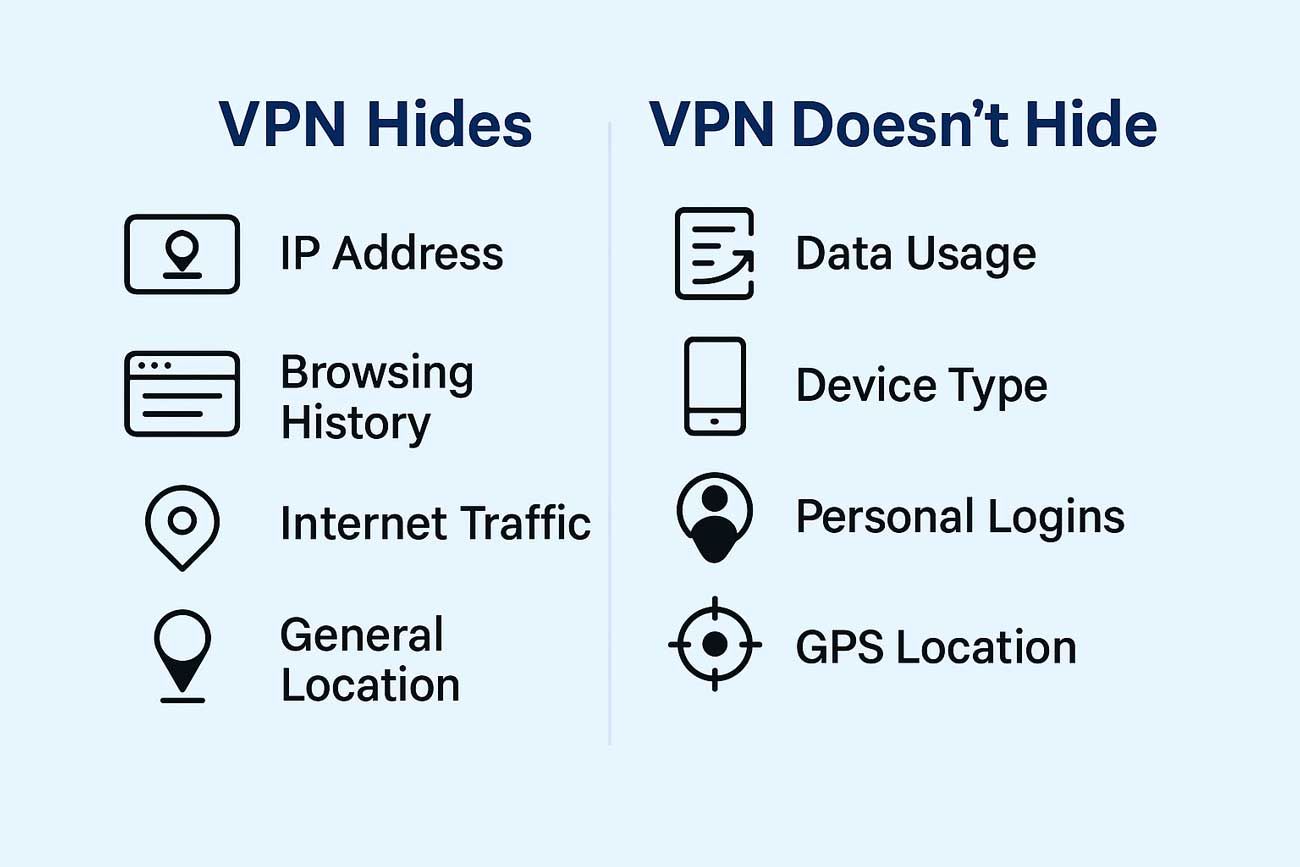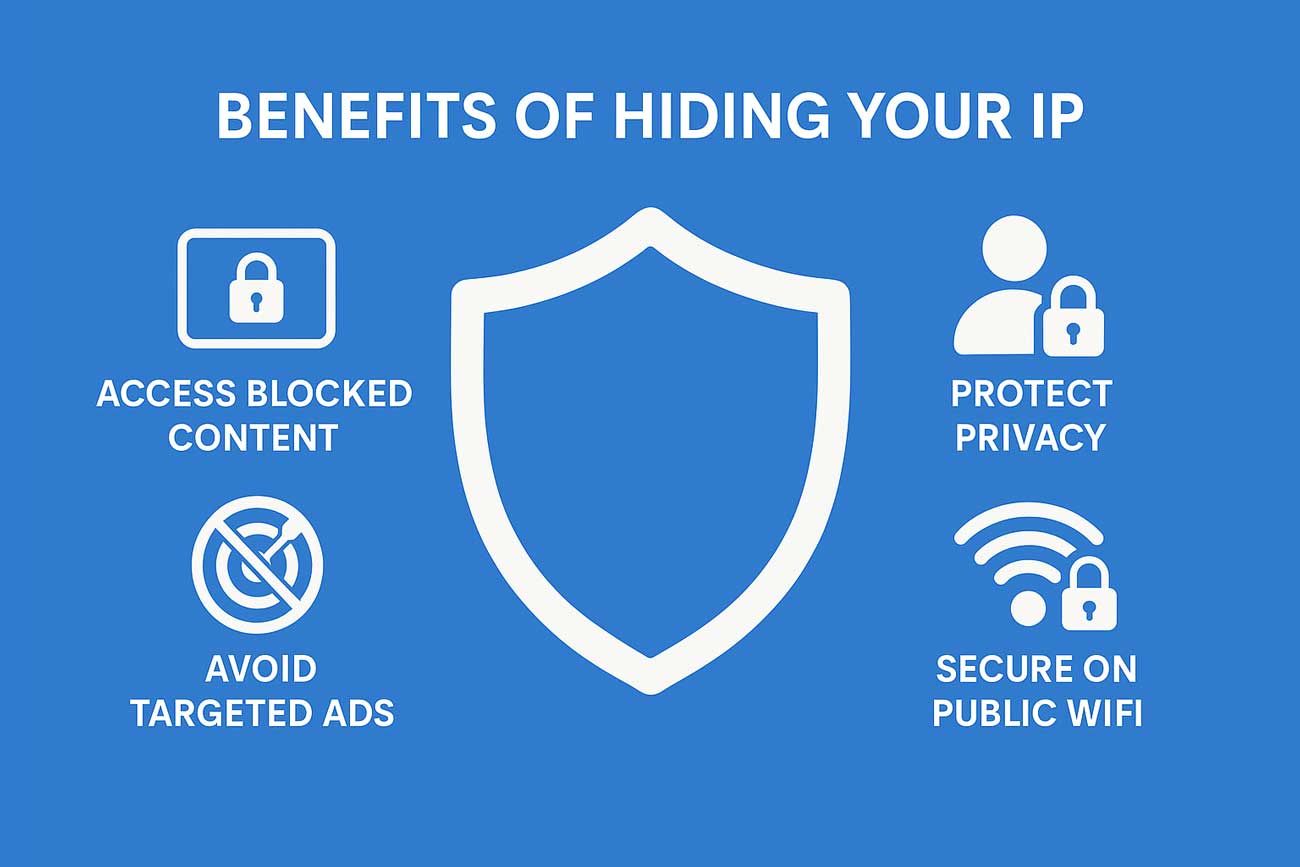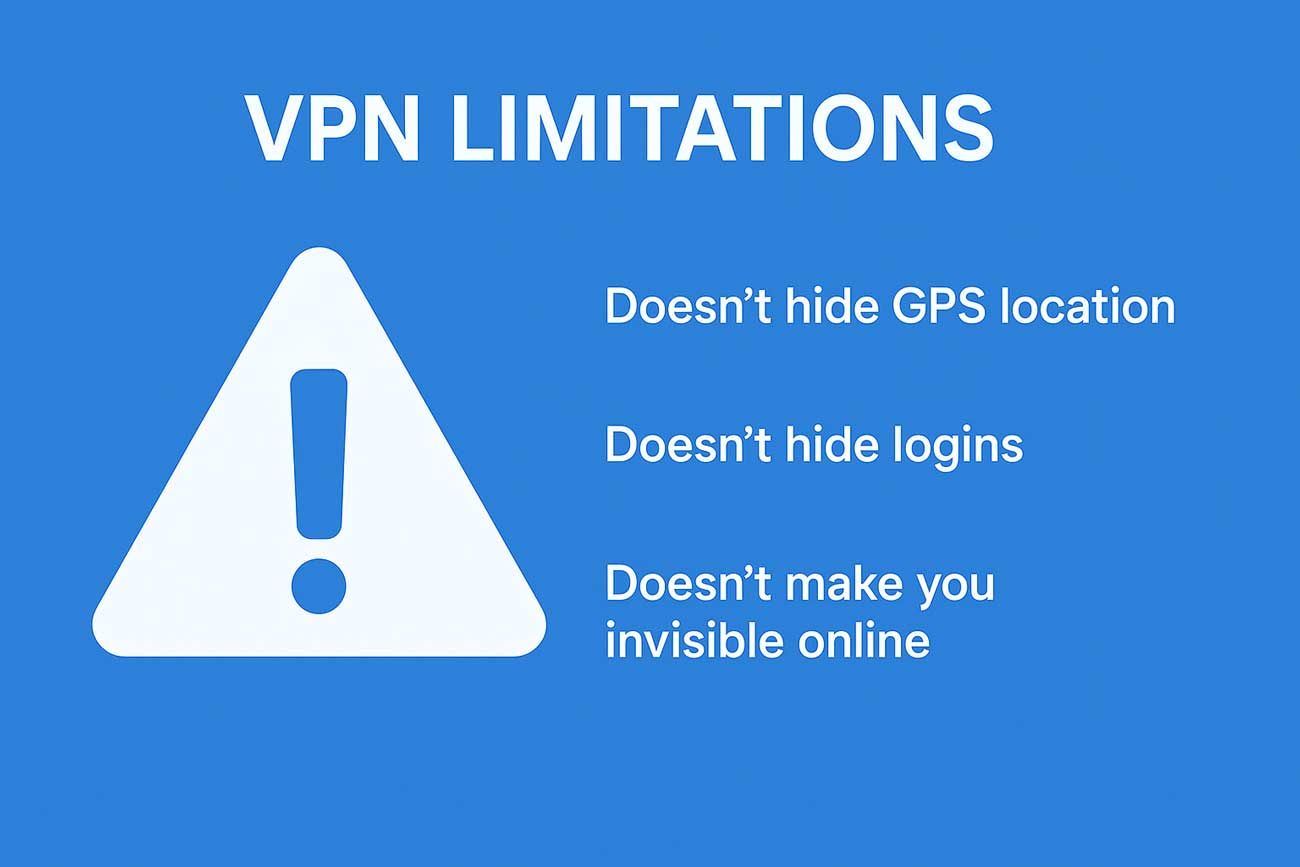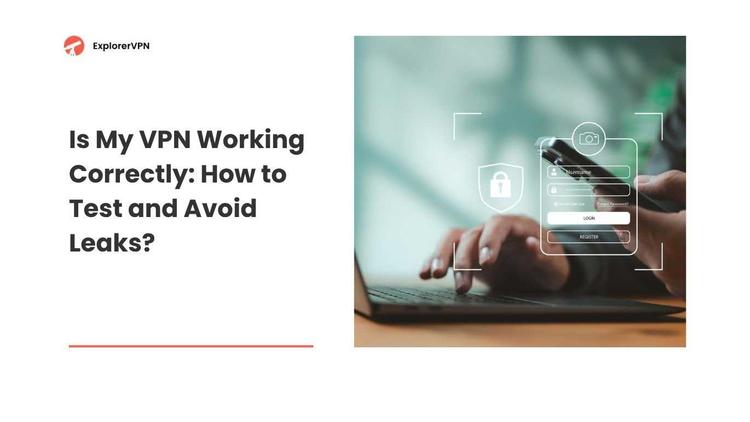A VPN, which stands for Virtual Private Network, mainly hides your real IP address and your online activity from prying eyes. It works by sending your internet traffic through an encrypted tunnel to a remote VPN server, giving you a new IP address and helping protect your online privacy.

What VPN hides VS What Doesn't Hide
What Does a VPN Hide?
Here's what a VPN actually hides:
Your IP Address
Your IP address is like a unique address for your device on the internet. It tells websites and services where your connection is coming from. Without a VPN, your actual IP address is exposed every time you visit a site. This address can be used to track your physical location, your internet service provider, and sometimes even your general city or neighborhood.
When you use a VPN, it hides your IP address by assigning you the VPN server’s IP address. For example, if you live in New York but connect through a VPN server in London, websites will think your connection is coming from London. This makes it much harder for websites, advertisers, or other third parties to know your real location or link your browsing activity directly to you.
This feature is especially helpful for online privacy and for accessing content from different regions. Streaming services, for example, often limit shows based on location. By hiding your IP and giving you a new one, a VPN can make it look like you are in a different location.
Your Internet Traffic
Every time you visit a website, send a message, or watch a video, that information travels as internet traffic through your ISP and across networks. Normally, this traffic can be monitored, intercepted, or recorded. That means network administrators, WiFi owners, or hackers on public Wi Fi networks can potentially see your online activity.
A VPN protects this by using an encrypted tunnel. The VPN encrypts your incoming and outgoing traffic, turning your browsing data into scrambled, unreadable code. Anyone trying to spy on your connection will only see encrypted traffic that makes no sense.
For example, imagine using free WiFi at an airport. Without a VPN, hackers could sniff your browsing data and see what websites you visit or even steal sensitive information. With a VPN, the encrypted tunnel makes it impossible for them to read your data, protecting your online identity and online security.
Your Browsing History
Many people ask: does VPN hide browsing history from WiFi owner or does VPN hide from ISP? The answer is yes. Normally, your ISP or the person running the WiFi network can see your browsing history, search history, and DNS requests. They can log what sites you visit and sometimes even sell that data to advertisers.
A VPN helps by hiding your browsing activity. Your ISP still sees that you are connected to a VPN server, but they cannot see which websites you visit or what you search for. Your browsing history stays private because all they see is encrypted traffic moving to and from the VPN service.
This also means network administrators at school or work cannot spy on your browsing activity when you use a VPN. Your browsing data is hidden from their prying eyes, giving you more freedom online.
Your General Location
Websites often use your IP address to guess your general location. They may not know your specific GPS coordinates, but they can figure out your city or country. This information is often used for targeted ads, location tracking, or blocking access to content in certain regions.
A VPN hides your general location by replacing your real IP with the VPN server’s IP address. For instance, if you are in California but connect through a server in Japan, your internet activity will appear to come from Japan. This confuses websites and protects your real location from being exposed.
This is why VPNs are commonly used to bypass location tracking and access region-locked content. By hiding your general location, a VPN helps keep your online activity private and gives you more control over what websites know about you.
Some VPN providers offer advanced features like Onion over VPN. Normally, a VPN encrypts your data once and sends it through a VPN server but with Onion over VPN, your encrypted traffic then goes through the Tor network, which bounces your connection through several volunteer-run servers around the world. This makes it extremely difficult to trace your online activity back to you. Even if someone tried to follow your browsing data, it would appear to come from multiple different locations before reaching its final destination.
What Doesn’t a VPN Hide?
There are also some things that people think a VPN hides but it actually doesn't.
How Much Data You Use
Even though a VPN hides your browsing history and online activity, it cannot hide how much data you use. Your ISP can still see the size of your internet traffic. For example, they might notice that you downloaded 5 gigabytes of data in one day. They won’t know what sites you visited or what files you downloaded, but they can measure the amount of outgoing and incoming traffic.
This is important if your internet service provider has data caps. A VPN does not make your usage invisible; it only hides the details of your browsing activity. Your ISP will still know how much data passed through your secure connection.
Your Device Type
A VPN cannot completely hide what type of device you are using. Websites can often detect whether you are visiting from a phone, tablet, or laptop by looking at your browser settings, device type, and screen size. Even though the VPN encrypts your traffic, these details are part of the request your device makes to the website.
For example, a site might know that someone using a VPN is on an iPhone in “a different location,” even if they cannot see your actual IP address. So while the VPN hides your location and browsing history, it does not fully cover up the type of device you use.
Personal Accounts and Logins
A VPN does not hide your identity if you log into personal accounts. If you open your email, sign into social media, or use online banking, the website will know it is you. Even though the VPN hides your IP address, logging in directly connects your online activity with your personal account.
For example, if you use Facebook while connected to a VPN, Facebook still knows it is your account. The VPN does not erase your online identity inside platforms where you are signed in. This means you must be careful not to assume a VPN makes you anonymous everywhere.
GPS Location
A VPN hides your IP-based location, but it does not hide your GPS location if your device shares it. Apps on your phone often request specific GPS coordinates. Even if your VPN makes it look like you are in a different country, your phone’s GPS location can still reveal your real location.
For example, people often ask: does a VPN hide your location on iPhone? The answer is that it hides your IP address location, but not your GPS location. Unless you turn off GPS or deny apps permission to access it, your real location can still be exposed.
This shows that VPNs are strong at hiding your general location from websites, but not perfect when it comes to device-level location tracking.

benefits of hiding your ip
Who Can See What You Do With a VPN?
When using a VPN, your ISP cannot see your browsing activity. They only see that you are connected to a VPN server. Network administrators at school or work also cannot see your search history or browsing activity.
Websites see the VPN server’s IP address instead of your real location. However, your VPN provider could see your online traffic because it passes through their remote server. That is why it is important to check your VPN’s privacy policy to make sure they do not keep logs of your browsing history.
So, only you and possibly the VPN provider can see your browsing data. But if your VPN has a strong privacy policy and no logs, then only you know your online activity.
Does a VPN Hide You Completely?
No, a VPN does not hide you completely. While a VPN encrypts your internet connection and helps with online privacy, it cannot make you totally invisible. Some websites still use cookies and trackers to follow your browsing activity. Apps on your phone may collect location data through GPS.
And sometimes, using a VPN can cause slowing down the internet because your traffic is traveling through an encrypted tunnel to a remote server, which takes extra steps.
So, a VPN hides your real IP address and online activity from many prying eyes, but it does not erase your online identity entirely.
Can You Be Tracked If You Use a VPN?
Yes, you can still be tracked, but it is much harder. For example, if you log into your personal accounts, websites will know it is you. Streaming services may also use advanced methods like location tracking or detecting VPN servers.
Governments and other third parties could track you if they force a VPN provider to give them information. But if you are using a strong VPN with good privacy practices, tracking your online traffic becomes very difficult.
So while you can be tracked, using a VPN makes it much harder for ISPs, websites, and other parties to follow your browsing activity.
Does a VPN Hide Your IP?
Yes, a VPN hides your IP address by giving you a new IP address from the VPN server. This makes it look like you are in a different location.
Many people wonder about Proxy vs VPN. A proxy server can also hide your IP address, but it does not encrypt your internet traffic. A VPN encrypts your online traffic and hides both incoming and outgoing traffic, making it more secure. That is why a VPN is better than just using a proxy.
So yes, a VPN hides your IP, and it also provides a secure connection with an encrypted tunnel.
What Are the Benefits of Hiding Your IP Address?
Hiding your IP address gives you several important benefits for online privacy and security:
- Websites cannot easily track your browsing history, browsing activity, or online traffic.
- Targeted ads that use your unique address to follow you around the internet become less effective.
- Your online identity is better protected when you connect through public Wi Fi networks, since hackers cannot see your browsing data inside the encrypted tunnel.
- You can access websites, apps, and streaming services that may be blocked or restricted in your general location.
- Using a VPN to hide your IP address adds an extra layer of security for sensitive information and your real location.
Can VPNs See My Browsing History?
Yes, technically a VPN provider can see your browsing history because your online traffic passes through their remote server. However, most good VPN services promise not to keep logs of your browsing activity.
That is why it is important to read your VPN’s privacy policy. If the VPN keeps no logs, then your browsing history is not stored anywhere. But if they do log data, your browsing history could be recorded.
So the answer is that VPNs could see it, but trustworthy providers will not keep it.
Does a VPN Hide Your Location?
Yes, a VPN hides your location by showing websites the VPN server’s IP address instead of your real IP address. This makes it look like you are in a different location, sometimes even in a different country.
For example, people ask, does a VPN hide your location on iPhone? The answer is yes, it hides your IP address location, but your iPhone’s GPS location could still reveal where you are if apps access it.
So a VPN hides your general location based on your IP, but it does not hide specific GPS coordinates unless you turn off location tracking in your device.

vpn limitations
How Do I Know If My VPN Is Working?
You can check if your VPN is working by looking at your IP address before and after connecting. First, search “what is my IP address” online without a VPN. Then connect to your VPN service and check again. If the IP address changes to the VPN server’s IP address in a different location, then the VPN is working.
You can also check if your internet traffic is going through the encrypted tunnel by using websites that test DNS requests. If the results show your VPN’s remote server instead of your ISP, then your VPN is protecting your browsing activity.
Another way to know if it is working is to try accessing streaming services or sites that are usually blocked in your real location. If you can access them, then the VPN is doing its job.
Conclusion
A Virtual Private Network hides your real IP address, online activity, and browsing data from ISPs, websites, and other prying eyes. It uses an encrypted tunnel to route your internet traffic through a remote server, giving you a new IP address and more online security.
But it does not hide everything. Your device type, how much data you use, or GPS location may still be visible. Also, your VPN provider could see your browsing history if they keep logs.
Still, VPN helps give you an extra layer of online privacy and makes it much harder for others to track your internet activity. Despite that a VPN sometimes can slow down the internet connection, it is a great tool to secure your onine privacy.









